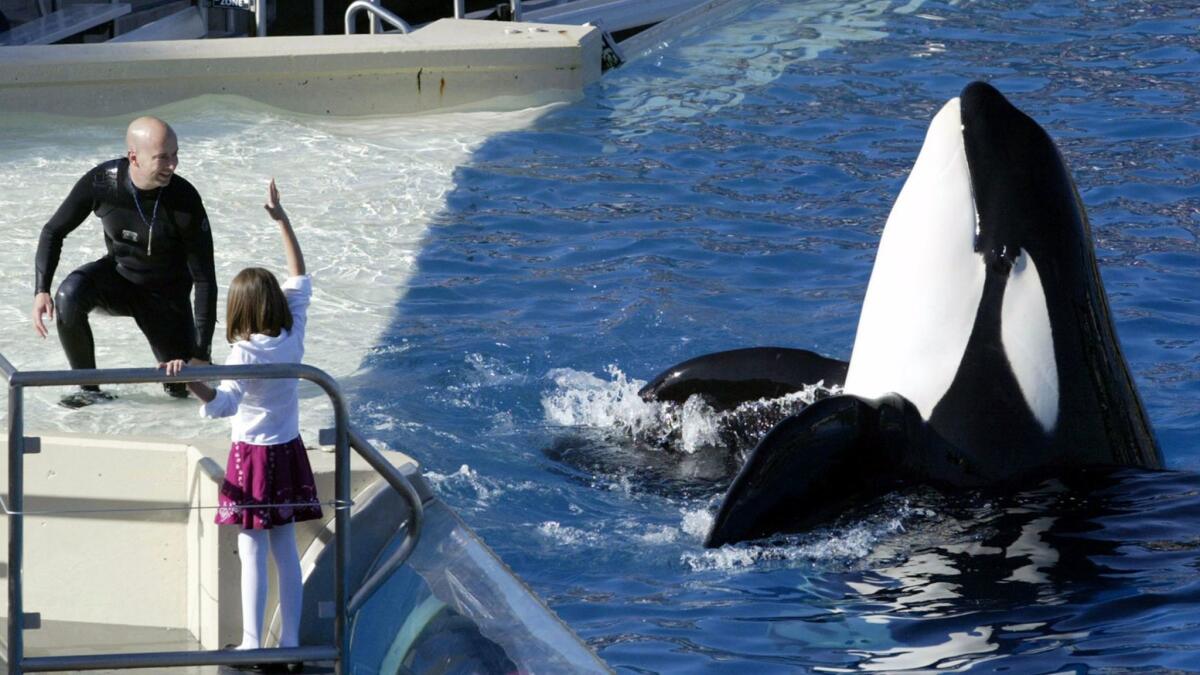SeaWorld emails show execs knew ‘Blackfish’ hurt business long before they told investors

Amid mounting cancellations by performers and lost business, SeaWorld executives revealed in internal emails that the 2013 “Blackfish” documentary was affecting revenues — long before they publicly acknowledged that the controversy was harming the company.
Growing frustration over the backlash from the anti-captivity film bubbled to the surface in an email about performer Willie Nelson’s decision to cancel an upcoming concert at the Orlando park in 2013.
“This whole [expletive] thing pisses me off,” Fred Jacobs, who then was SeaWorld Entertainment Inc.’s vice president of corporate communications, wrote in a December 2013 email. “God we look like idiots.”
Jacobs’ email was among a number of communications unsealed this week as part of ongoing litigation against SeaWorld concerning shareholders’ claims that the company misled investors early on when it denied fallout from “Blackfish” had anything to do with decreasing attendance at its SeaWorld parks in Orlando, San Diego and San Antonio.
The federal government, in the midst of a related criminal investigation into SeaWorld, was granted permission in September to intervene in the investors lawsuit.
SeaWorld declined to comment Thursday on the correspondence because it is related to ongoing litigation but said that the company “remains ever-focused on our mission to inspire people to protect animals and the world’s oceans.”
A number of the emails unsealed this week by the court make reference to “Blackfish,” including one with the subject line, “Lost Blackfish revenue — confidential.” It is dated Jan. 13, 2014, seven months before SeaWorld executives admitted the documentary was affecting park attendance, the suit maintains.
In an August 2014 earnings call with analysts, the company attributed falling visitation to ongoing controversy surrounding its killer whales, although it did not cite “Blackfish” specifically.” Instead, it mentioned proposed California legislation seeking to outlaw the use of trained captive orcas in Shamu Stadium at San Diego’s SeaWorld.
In January 2014, though, company leaders confidentially tallied a list of lost revenue from “Blackfish,” according to the released emails.
That tally, which was not disclosed in court documents, came in response to an email from Toni Caracciolo, then SeaWorld’s vice president of global brand management, the marketing team to fill out a spreadsheet titled “Lost Blackfish Revenue.”
In her email, Caracciolo cautioned, “Please do not distribute outside directors/managers as should keep confidential we are keeping a list of this.”
In another email, Donnie Mills, then president of the company’s Orlando parks, wrote, “The impact of our detractors has found its way to caterings. To date we have 6 cancellations.”
In that correspondence, Mills noted that those canceling cited “BF (Blackfish) or activists commentary.”
“Frustrating …” wrote Jim Atchison, SeaWorld’s chief executive at the time.
The company’s first quarter earnings for 2014, though, never referenced “Blackfish” and instead blamed disappointing park attendance on a shift on when Easter fell and seasonal closures of some parks.
In addition to the email disclosures about SeaWorld’s efforts to address fallout from “Blackfish,” the company also tried to flood an Orlando Sentinel online poll related to the movie.
“Let’s keep flooding it. Have also heard if you click ‘no,’ [then] click on ’vote’ multiple times, it will count multiples votes. Like a hundred or so,” Nick Gollattscheck, then a company spokesman, wrote in an email on Christmas Eve 2013. “Happy holidays and keep voting. Ho ho vote.”
In hindsight, SeaWorld leadership probably should have been more forthcoming early on about the so-called “Blackfish” effect, said analyst Bob Boyd of Pacific Asset Management. If nothing else, the emails are more evidence of the difficulties SeaWorld will continue to have in resurrecting its beleaguered brand, he said.
“Their original strategy was to ignore the issue and hopefully it would go away,” Boyd said. “The current management team, through the changes they’ve made like ending the breeding of orcas, has made a strong attempt to address those issues, but what we’ve seen with SeaWorld performance this year, this issue is simply not going away.”
The release of the emails comes amid continuing bad news about SeaWorld’s financial performance. In its latest earnings release this week, SeaWorld Entertainment reported that attendance and revenue declined sharply during the third quarter, which encompasses much of the important summer season.
Companywide, attendance in July, August and September declined nearly 9%, with 732,000 fewer people visiting SeaWorld’s 12 theme parks compared with the same quarter last year.
SeaWorld executives have said that the San Diego park in particular had been affected by “public perception” issues and the company is trying to combat that with a new advertising campaign intended to highlight SeaWorld’s animal rescue and ocean conservation efforts.
lori.weisberg@sduniontribune.com







